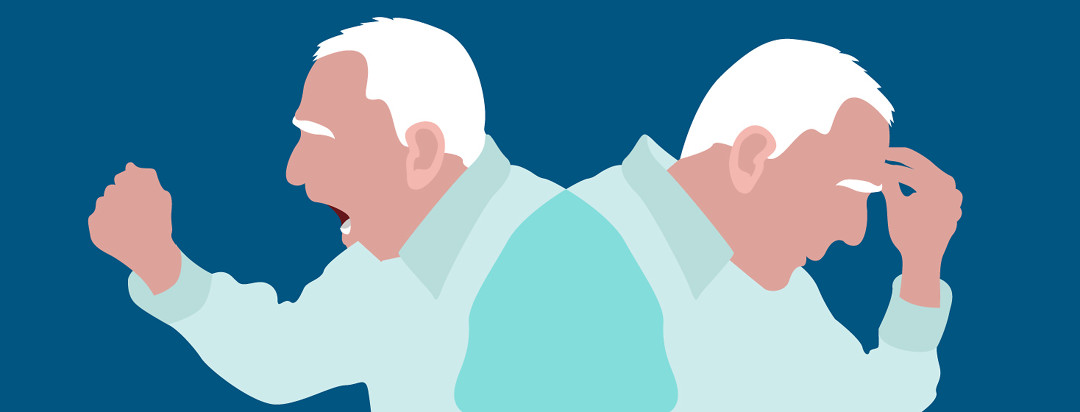Emotional Challenges of an Alzheimer’s Diagnosis: Results From Our Survey
Alzheimer’s disease is not an easy diagnosis to accept. For many, it brings fears and challenges, which is only natural given that so much of Alzheimer’s means dealing with uncertainty.
To get a better picture of what Alzheimer’s looks like for people with the disease and their caregivers, we surveyed 63 patients and 305 caregivers as part of the 2019 Alzheimer's In America survey. When asked about the most challenging thing about being diagnosed with Alzheimer's, 50 patients responded. Here is what they had to say:
Fear of future
It’s only natural that the most common response to the question was a fear of the future. Alzheimer’s, as you know, is a progressive disease with three stages - mild, moderate and severe. The only variable is how long it takes an individual to progress into the next stage, and there is no average timeline. This disease affects everyone differently, which is both the bad news and the good news.
Anger
Anger was another common response. With an Alzheimer's diagnosis, there is a loss of control. The person diagnosed might be angry about forgetting words and misplacing objects, or that everyday tasks have become more difficult. But most of all, both the person with Alzheimer's and their caregiver may be angry at losing the life they had before Alzheimer’s.
Giving up the ability to drive
For most of us, driving a car means freedom, which is why it’s one of the hardest things to give up. Eventually, most people with Alzheimer’s reach a point where driving is no longer safe or possible. The many dangers of driving when Alzheimer’s has progressed include getting lost, driving too slowly, hitting the curb, and mixing up the gas and brake pedals. Having your keys taken away, or having to take someone’s keys, remains one of the most devastating milestones of the disease.
Feeling lonely
In a recent study conducted by the Alzheimer’s Society, 35 percent of people living with Alzheimer’s report feeling lonely. One possible reason for increased loneliness is that the stigma around living with dementia causes some people to isolate themselves.
Memory
One of the great challenges of Alzheimer’s is knowing that memory will be compromised. Memory loss begins on a small scale, with forgetting where keys and other objects are. Sadly, because of the disease progression, the person may start to forget more and more without realizing it is happening.
Losing control of life
Bigger than just losing the option to drive is accepting that this disease may affect many aspects of a person’s life. Of course, this is also a big challenge to face. As memory loss makes more and more everyday actions difficult or impossible, you may find that you need increasing help from others. Both emotional and physical support, from a ride to the store to a daily phone call reminding you to take your drugs can be hard to ask for, but can be a tremendous help.
Not being able to control their actions anymore
For some people, Alzheimer’s affects the ability to get around. The Alzheimer’s Association reports that 6 in 10 people living with Alzheimer’s will wander at some point in their lives. The reason is unknown, but Alzheimer’s can also affect the ability to sleep.
Will they become totally unable to care for themselves
Most people with Alzheimer’s and their caregivers worry about what the future will look like when they are no longer able to take care of themselves. The good news is that creating a routine for diet and exercise, getting regular check-ups, and getting plenty of sleep can help mitigate aspects of the disease.
Waiting for the unknown
Waiting for the unknown was frequently mentioned as the most challenging aspect of an Alzheimer’s diagnosis. While doctors can offer some predictions about the disease, every individual is different in how their particular Alzheimer’s symptoms progress.
Not understanding all that’s going on
Forgetting names, mixing up dates, not remembering details are all part of the challenges of Alzheimer’s. Alzheimer’s can also affect spatial reasoning and the ability to solve problems. But, every symptom is only a possibility, not a certainty.
Knowing what is coming
It is natural to be anxious about what comes next. Granted, everyone experiences anxiety about the future, but Alzheimer’s disease provides plenty to be anxious about. Knowing what to expect at each stage in the disease may help plan ahead and bring some peace of mind.

Join the conversation